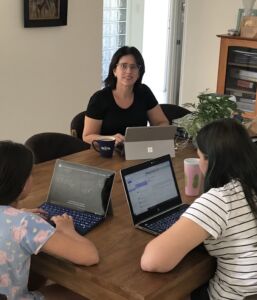The start of the school year is always a whirlwind for children and families.
New classrooms, classes, teachers and routines. By the time families draw breath, Term 1 is almost over.
According to Queensland Independent Schools Parents Network Executive Officer Justine Cirocco, once everyone settles into the rhythm of the school year, Term 2 presents a perfect opportunity for schools, teachers and families to build their partnerships and the best ways to work together to support student learning.
Power of family-school partnerships backed by research

QIS Parents Network Executive Officer Justine Cirocco
Ms Cirocco says more than 50 years of national and international research shows that when schools and families pool their collective expertise to support student learning – what experts call “parent engagement” – the impact on student outcomes and wellbeing can be significant.
Countless studies have shown that parent engagement in student learning can lead to:
- improved skills academically, socially and emotionally
- increased motivation, achievement and success at school
- more regular school attendance
- higher rates of retention, graduation and uptake of tertiary studies
- strengthened belief in the importance of education
- heightened aspirations for learning in school and beyond.
So what is “parent engagement”?
The answer is as much about “what it isn’t” as “what it is”.
Parent engagement is not about parents signing up for reading groups or tuckshop duty. Although this is very important for building community, parent engagement extends beyond “involvement” in school life to parents “engaging” in and supporting their child’s learning at home.
When learning moved from the classroom to the dining room for the majority of Queensland students for part of Term 2 in 2020, many parents and carers became engaged in their child’s education like never before. Learning became visible. Technology gave teachers and parents a front-row seat into each other’s roles and lives. Parent-teacher interviews moved online, schools engaged parents in school challenges or undertook regular wellbeing checks.
An issues paper commissioned by the peak body representing Queensland’s more than 220 independent schools – Independent Schools Queensland – found this short-term period could have long-term benefits for school-family partnerships and student outcomes.
How and where do you start with parent engagement?
According to experts, the first step to strengthening the communication and rapport between home and school is parents making themselves known to their children’s teachers.
“First impressions are really important,” according to one of Australia’s leading parent engagement voices, Griffith University’s Dr Linda Willis.

Griffith University’s Dr Linda Willis
“Building a mutually respectful relationship with your child’s teacher from day one – and viewing each other as partners in the education process – builds a wonderful base for future communication and trusting relationships,’’ Dr Willis says.
Through her state-wide research with Griffith colleague Professor Beryl Exley, Dr Willis has seen first-hand the great outcomes for students when schools and families respect each other’s unique contributions to a child’s education.
Simple examples of how schools can engage parents in their child’s learning include, regular emails to parents with updates on classroom learning so parents can talk about and extend on these topics at home. Running workshops for parents that upskill them in key areas such as reading, study strategies, or new education software being used by the school also arm parents with the knowledge and tools they can use to support consistency in student learning.
Schools also have an equally important role to play
Respected Canadian parent engagement academic and former school principal Dr Linda Kaser says a productive and healthy relationship requires both parties – school and family – to play their parts.
“In some schools, teachers fear parent involvement and only call home when they need to report a problem,” Dr Kaser says.
“But when teachers send a very short text every Friday afternoon to two parents with a ‘this is something that went well for your child this week’ information item – that can really help foster connections.”
Parents can also adopt some simple behaviours to strengthen the school-home relationship.
Key ones include showing your child how much you value education through activities such as reading with them, encouraging good study habits and creating a stimulating home environment.
Dr Kaser also offered these additional tips for families:

Parent engagement expert Dr Linda Kaser
- Be genuinely interested in creating a daily dialogue with your child about what is being learned at school.
- Teachers are people too! Thank them for their work. A quick text describing the impact on your child can be a big boost.
- Share information with your child’s teacher about your child, such as their interests, and engage with your teacher about their interests too so that you can make a personal link.
- You are your child’s first and continuing teacher. Make your skills “visible” to your child and talk about when you learned them and how you are applying them.
- Use the word YET when your child is learning something new or finding something hard that they haven’t mastered it “yet”. Encourage your child to do the same when they are describing their own learning progress.
Want to delve deeper into parent engagement?
The QIS Parents Network website is a rich well of information and resources for parents and teachers who wish to ‘power up’ their parent engagement practices.
Visit our dedicated portal for parents and for schools to read more about this important contributor to student success and well-being.




